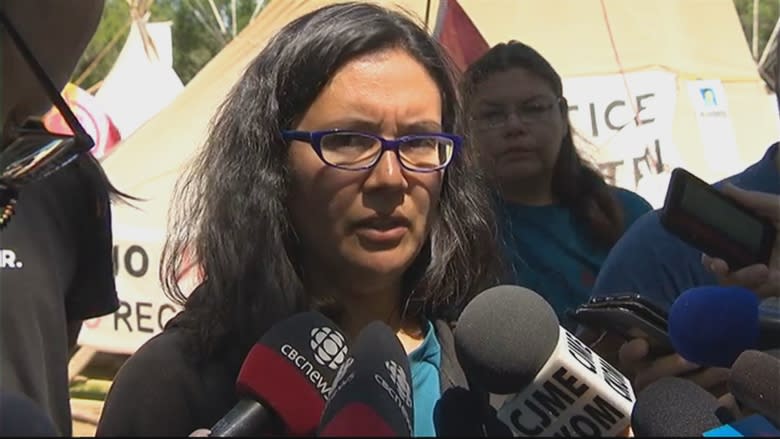Regina justice camp to launch legal action over arrests
The Justice For Our Stolen Children camp says it has launched legal action in response to arrests that took place at the camp last month.
In June, six members of the camp were arrested by Regina police in an attempt to break up the camp, set up near the Saskatchewan Legislative Building. No charges were laid, and those arrested were released hours later.
While the camp was dismantled by park staff, it was raised again only days later, eventually growing to 14 teepees.
The legal action, launched Monday, asks the court for a declaration that the protest is protected under the Charter of Rights and Freedoms and that the June arrests were unconstitutional.
"We say these people have a right to be here and to express themselves, and we say that right is more important than the government's interest in a green lawn," the camp's legal counsel Dan LeBlanc told reporters on Monday.
He explained said the action is meant to shore up the camp's status in hopes of preventing similar evictions.
"We're hoping this will affect government action moving forward," said LeBlanc. "In our application, we don't make claim for damages or monetary compensation in any sort."
LeBlanc said the camp members have a right to free speech under the charter that must be protected.
He also noted that the six people were only arrested as part of the police's efforts to break up the camp and to take down the teepees.
"At law, that is without basis," said LeBlanc. "The arrests were therefore illegal and unconstitutional."
'Extreme disappoint' at government response
The camp met with government ministers on July 2 to discuss their concerns, including the overrepresentation of Indigenous children in foster care and the amount of Indigenous men and women in the justice system.
In a statement Monday, a government spokesperson said it will continue to meet with the Federation of Sovereign Indigenous Nations and Tribal Chiefs to discuss those issues raised.
The government did not provide further comment, but circulated a copy of the responses sent to the camp, underling the efforts already been undertaken in the ministries of social services and justice.
"The Government of Saskatchewan's expectation continues to be that the unpermitted camp will be removed from Wascana Park," the letter reads.
Read the full letter here:
Camp members said Monday they have no plans to leave.
"The camp is staying here," said Prescott Demas. "We're waiting for the second meeting."
Camp spokesperson Robyn Pitawanakwat expressed displeasure at the fact the government did not commit to fulfilling any of the requests made by protestors.
"It's extreme disappointment," she said. "The response from government was they're already doing everything and they don't need to change anything. And the stories that are coming in here indicate the exact opposite."
Request ranged from holding an inquest into the death of Haven Dubois — a 14-year-old found dead in about a metre of water three years ago—to reviewing all long-term social services ward to see what opportunities exist for reunification.
The court application is scheduled to be heard August 23 in Regina's Court of Queen's Bench, LeBlanc said.
No second meeting planned
Last week, Premier Scott Moe told reporters he won't be visiting the camp, saying he has never visited any protest in front of the legislature.
"We don't necessarily need him to come visit for him to enact change," said Pitawanakwat.
She says the government didn't commit to the second meeting, but did commit Friday to responding to the issues brought up at the July 2 meeting.
"We are still waiting for that," said Pitawanakwat.
Richelle Dubois, who helped start the camp, said one of the top actionable items she wants to see is an inquiry into missing and murdered Indigenous men and boys.
Dubois has been outspoken about concerns with the investigation into her 14-year-old son's death in 2015.
After meeting with the camp, Justice Minister Don Morgan said the government will be working with its First Nations partners, including all tribal councils and the FSIN, to address issues brought up by the camp.
More camps starting
The camp started with one teepee almost five months ago, which was eventually taken down by police, but has since grown to 14.
Similar camps have been set up in other Canadian cities, including Winnipeg and Saskatoon.
"I think it just continues to show that these issues are happening everywhere," said Pitawanakwat.
The Saskatoon camp was set up by Chris Martell, whose 22-month-old son drowned while in foster care in 2010.
"The provincial is not addressing the issues that led to his son's death, with overcrowding and improper foster homes," Pitawanakwat said.
"Provincial governments need to be making some serious changes, especially in the prairies, in order to address these issues in a good way."



